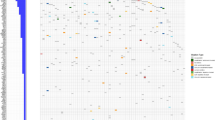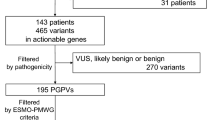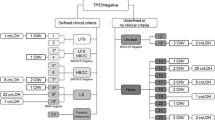Abstract
Multiple primary tumors (MPTs) are a harbinger of hereditary cancer syndromes. Affected individuals often fit genetic testing criteria for a number of hereditary cancer genes and undergo multigene panel testing. Other genomic testing options, such as whole exome (WES) and whole genome sequencing (WGS) are available, but the utility of these genomic approaches as a second-tier test for those with uninformative multigene panel testing has not been explored. Here, we report our germline sequencing results from WGS in 9 patients with MPTs who had non-informative multigene panel testing. Following germline WGS, sequence (agnostic or 735 selected genes) and copy number variant (CNV) analysis was performed according to the American College of Medical Genetics (ACMG) standards and guidelines for interpreting sequence variants and reporting CNVs. In this cohort, WGS, as a second-tier test, did not identify additional pathogenic or likely pathogenic variants in cancer predisposition genes. Although we identified a CHEK2 likely pathogenic variant and a MUTYH pathogenic variant, both were previously identified in the multigene panels and were not explanatory for the presented type of tumors. CNV analysis also failed to identify any pathogenic or likely pathogenic variants in cancer predisposition genes. In summary, after multigene panel testing, WGS did not reveal any additional pathogenic variants in patients with MPTs. Our study, based on a small cohort of patients with MPT, suggests that germline gene panel testing may be sufficient to investigate these cases. Future studies with larger sample sizes may further elucidate the additional utility of WGS in MPTs.
Similar content being viewed by others
Data availability
The datasets generated during and/or analyzed during the current study are available from the corresponding author upon reasonable request.
References
Ngeow J, Eng C (2016) Precision medicine in heritable cancer: when somatic tumour testing and germline mutations meet. NPJ Genom Med 1:15006. https://doi.org/10.1038/npjgenmed.2015.6
Garber JE, Offit K (2005) Hereditary cancer predisposition syndromes. J Clin Oncol 23(2):276–292. https://doi.org/10.1200/JCO.2005.10.042
Whitworth J, Smith PS, Martin JE et al (2018) Comprehensive cancer-predisposition gene testing in an adult multiple primary tumor series shows a broad range of deleterious variants and atypical tumor phenotypes. Am J Hum Genet 103(1):3–18. https://doi.org/10.1016/j.ajhg.2018.04.013
Cybulski C, Nazarali S, Narod SA (2014) Multiple primary cancers as a guide to heritability. Int J Cancer 135(8):1756–1763. https://doi.org/10.1002/ijc.28988
Whitworth J, Hoffman J, Chapman C et al (2015) A clinical and genetic analysis of multiple primary cancer referrals to genetics services. Eur J Hum Genet 23(5):581–587. https://doi.org/10.1038/ejhg.2014.157
Chan GHJ, Ong PY, Low JJH et al (2018) Clinical genetic testing outcome with multi-gene panel in Asian patients with multiple primary cancers. Oncotarget 9(55):30649–30660. https://doi.org/10.18632/oncotarget.25769
Bychkovsky BL, Lo MT, Yussuf A et al (2022) Prevalence and spectrum of pathogenic variants among patients with multiple primary cancers evaluated by clinical characteristics. Cancer 128(6):1275–1283. https://doi.org/10.1002/cncr.34056
Hou YC, Neidich JA, Duncavage EJ, Spencer DH, Schroeder MC (2022) Clinical whole-genome sequencing in cancer diagnosis. Hum Mutat 43(11):1519–1530. https://doi.org/10.1002/humu.24381
Xiao W, Ren L, Chen Z et al (2021) Toward best practice in cancer mutation detection with whole-genome and whole-exome sequencing. Nat Biotechnol 39(9):1141–1150. https://doi.org/10.1038/s41587-021-00994-5
Consortium ITP-CAoWG (2020) Pan-cancer analysis of whole genomes. Nature 578(7793):82–93. https://doi.org/10.1038/s41586-020-1969-6
Lionel AC, Costain G, Monfared N et al (2018) Improved diagnostic yield compared with targeted gene sequencing panels suggests a role for whole-genome sequencing as a first-tier genetic test. Genet Med 20(4):435–443. https://doi.org/10.1038/gim.2017.119
Neu MB, Bowling KM, Cooper GM (2019) Clinical utility of genomic sequencing. Curr Opin Pediatr 31(6):732–738. https://doi.org/10.1097/MOP.0000000000000815
Parsons DW, Roy A, Yang Y et al (2016) Diagnostic yield of clinical tumor and germline whole-exome sequencing for children with solid tumors. JAMA Oncol 2(5):616–624. https://doi.org/10.1001/jamaoncol.2015.5699
Trost B, Walker S, Wang Z et al (2018) A comprehensive workflow for read depth-based identification of copy-number variation from whole-genome sequence data. Am J Hum Genet 102(1):142–155. https://doi.org/10.1016/j.ajhg.2017.12.007
Ding Q, Somerville C, Manshaei R et al (2022) SCIP: software for efficient clinical interpretation of copy number variants detected by whole-genome sequencing. Hum Genet. https://doi.org/10.1007/s00439-022-02494-1
Te Paske I, Mensenkamp AR, Neveling K et al (2022) Noncoding aberrations in mismatch repair genes underlie a substantial part of the missing heritability in lynch syndrome. Gastroenterology 163(6):1691–1694. https://doi.org/10.1053/j.gastro.2022.08.041
Richards S, Aziz N, Bale S et al (2015) Standards and guidelines for the interpretation of sequence variants: a joint consensus recommendation of the American college of medical genetics and genomics and the association for molecular pathology. Genet Med 17(5):405–424. https://doi.org/10.1038/gim.2015.30
Riggs ER, Andersen EF, Cherry AM et al (2020) Technical standards for the interpretation and reporting of constitutional copy-number variants: a joint consensus recommendation of the American College of Medical Genetics and Genomics (ACMG) and the Clinical Genome Resource (ClinGen). Genet Med 22(2):245–257. https://doi.org/10.1038/s41436-019-0686-8
Casalino S, Frangione E, Chung M et al (2022) Genome screening, reporting, and genetic counseling for healthy populations. Hum Genet. https://doi.org/10.1007/s00439-022-02480-7
Shlien A, Malkin D (2009) Copy number variations and cancer. Genome Med 1(6):62. https://doi.org/10.1186/gm62
Byrjalsen A, Hansen TVO, Stoltze UK et al (2020) Nationwide germline whole genome sequencing of 198 consecutive pediatric cancer patients reveals a high incidence of cancer prone syndromes. PLoS Genet 16(12):e1009231. https://doi.org/10.1371/journal.pgen.1009231
Langenberg KPS, Meister MT, Bakhuizen JJ et al (2022) Implementation of paediatric precision oncology into clinical practice: the individualized therapies for children with cancer program “iTHER.” Eur J Cancer 175:311–325. https://doi.org/10.1016/j.ejca.2022.09.001
Wagener R, Taeubner J, Walter C et al (2021) Comprehensive germline-genomic and clinical profiling in 160 unselected children and adolescents with cancer. Eur J Hum Genet 29(8):1301–1311. https://doi.org/10.1038/s41431-021-00878-x
Schneider BP, Stout LA, Philips S et al (2020) Implications of incidental germline findings identified in the context of clinical whole exome sequencing for guiding cancer therapy. JCO Precis Oncol 4:1109–1121. https://doi.org/10.1200/PO.19.00354
Chang YS, Chao DS, Chung CC et al (2022) Cancer carrier screening in the general population using whole-genome sequencing. Cancer Med. https://doi.org/10.1002/cam4.5034
Loveday C, Garrett A, Law P et al (2022) Analysis of rare disruptive germline mutations in 2135 enriched BRCA-negative breast cancers excludes additional high-impact susceptibility genes. Ann Oncol 33(12):1318–1327. https://doi.org/10.1016/j.annonc.2022.09.152
Nones K, Johnson J, Newell F et al (2019) Whole-genome sequencing reveals clinically relevant insights into the aetiology of familial breast cancers. Ann Oncol 30(7):1071–1079. https://doi.org/10.1093/annonc/mdz132
Trotman J, Armstrong R, Firth H et al (2022) The NHS England 100,000 Genomes project: feasibility and utility of centralised genome sequencing for children with cancer. Br J Cancer 127(1):137–144. https://doi.org/10.1038/s41416-022-01788-5
Mandelker D, Ceyhan-Birsoy O (2020) Evolving significance of tumor-normal sequencing in cancer care. Trends Cancer 6(1):31–39. https://doi.org/10.1016/j.trecan.2019.11.006
Pasmans CTB, Tops BBJ, Steeghs EMP et al (2021) Micro-costing diagnostics in oncology: from single-gene testing to whole- genome sequencing. Expert Rev Pharmacoecon Outcomes Res 21(3):413–414. https://doi.org/10.1080/14737167.2021.1917385
Costain G, Cohn RD, Scherer SW, Marshall CR (2021) Genome sequencing as a diagnostic test. CMAJ 193(42):E1626–E1629. https://doi.org/10.1503/cmaj.210549
Acknowledgements
This study was conducted with support from the Cancer Genomics Program at Princess Margaret Hospital. RHK is supported by the Bhalwani Family Charitable Foundation, Karen Green and George Fischer Genomics and Genetics Fund, Lindy Green Family Foundation, the FDC Foundation, the Shar Foundation, and the Princess Margaret Cancer Foundation.
Funding
This work was supported by the University of Toronto Division of Medical Oncology Strategic Innovation Fund, the Soper Kidney Cancer Foundation, and the Princess Margaret Cancer Foundation.
Author information
Authors and Affiliations
Contributions
RHK: supervises this work, and all authors contributed to the study’s conception and design. YW, QD, SP, KMF, JB and TJP: performed material preparation, data collection, and analysis. JMC, MS and KE: conducted patient recruitment and informed consent. SC and JL-E: compiled the custom list of 735 cancer-associated genes. YW and RHK: wrote the first draft of the manuscript, and all authors read and approved the final manuscript.
Corresponding author
Ethics declarations
Conflict of interest
The authors declare no conflict of interest.
Ethical approval
The study was approved by the Research Ethics Board at the University Health Network (#16–5831) and is registered at clinicaltrials.gov (clinical trials registration number: NCT03857594).
Informed consent
Written informed consent was obtained from the patients to publish this report in accordance with the journal's patient consent policy.
Additional information
Publisher's Note
Springer Nature remains neutral with regard to jurisdictional claims in published maps and institutional affiliations.
Supplementary Information
Below is the link to the electronic supplementary material.
Rights and permissions
Springer Nature or its licensor (e.g. a society or other partner) holds exclusive rights to this article under a publishing agreement with the author(s) or other rightsholder(s); author self-archiving of the accepted manuscript version of this article is solely governed by the terms of such publishing agreement and applicable law.
About this article
Cite this article
Wang, Y., Ding, Q., Prokopec, S. et al. Germline whole genome sequencing in adults with multiple primary tumors. Familial Cancer 22, 513–520 (2023). https://doi.org/10.1007/s10689-023-00343-2
Received:
Accepted:
Published:
Issue Date:
DOI: https://doi.org/10.1007/s10689-023-00343-2




